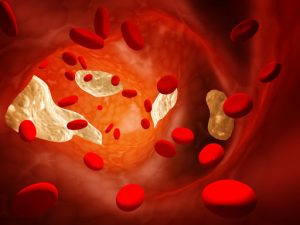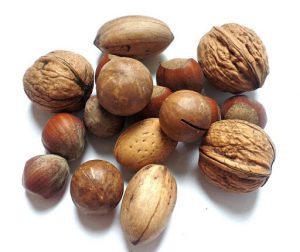Triglycerides don’t get nearly as much attention as cholesterol, even though they should. Both high cholesterol and high triglycerides can cause heart disease. So when you’re going plant-based, it’s normal to wonder: will a plant-based diet lower triglycerides?

About 25% of the American population has high levels of triglycerides. Given that they are directly linked with diet, it’s no surprise. But it’s not all environmental, certain genetic conditions can also cause unusually high levels of triglycerides.
A plant-based diet is greatly effective at lowering high cholesterol, but it’s also instrumental in optimizing triglycerides. This is one of the many ways it reduces the risk of heart disease.
What are Triglycerides?
Triglycerides are a kind of fat (lipid) in your blood that your body stores in your fat cells when it doesn’t need them. All the extra or unneeded calories in your body get converted into triglycerides and stored as fat for later use. In other words, the body stores it for energy.
Your hormones release stored triglycerides for energy in between your meals. So the more calories you eat, the higher triglycerides you get. These come mainly from carbohydrates and sugars, as the body converts the sugars into fat and stores it.
Triglycerides are important because they provide energy, but too much of them can be hazardous.
Triglyceride Levels
Triglycerides are usually measured through a lipid profile, which is a test for measuring cholesterol. This test tells you your total cholesterol, LDL cholesterol (bad cholesterol), HDL cholesterol (good cholesterol), and triglycerides.
Here are the typical normal and higher ranges of triglycerides:
| Below 150 | Normal |
| 150 to 200 | Borderline High |
| 200 to 500 | High |
| Above 500 | Very High |
Cholesterol vs. Triglycerides: It’s easier to confuse the two as one because they are both fats found in blood, but triglycerides function is different from cholesterol.
Why are Triglycerides High?
There can be many causes behind high levels of triglycerides, including some that are beyond one’s control. This is where it gets tricky because, in most cases, there are other factors contributing.
Genetic Problems
Triglycerides can be higher as a result of hereditary genetic problems. These include hyperlipidemia, hypoalphalipoproteinemia, and monogenic familial hypertriglyceridemia. These are quite rare, so only a very small percentage of people with high triglycerides have it because of genetics.
Carbs and Sugars
Eating too many carbs and sugary foods can considerably increase the number of triglycerides. There are only so many carbs your body needs for energy, so the rest of the sugars from sugary foods and carbs both turn into fat cells.

Obesity
Obese individuals may also have high triglycerides, which can, again, be a result of poor diet. A lot of consumption of processed carbs and sugary food over the years, combined with little to no physical activity, results in this.
Poorly Managed Diabetes
Diabetes patients who do not actively control their blood sugar levels can see their glycerides level rise too.
Thyroid Problems
An underperforming thyroid (hypothyroidism) is also associated with high triglycerides, mainly because thyroid hormones regulate metabolism.
Kidney Disease
You will also see your triglycerides high when you have kidney disease. In fact, they can be a sign of kidney problems.
Pregnancy
Pregnancy naturally increases both cholesterol levels and triglycerides. This results from the flow of nutrients to the placenta for the development.
Medications
Certain medications can also result in unusually high triglycerides as a side-effect. These medications include estrogens, androgens, glucocorticoids, diuretics, beta-blockers, acne medications, and HIV medication.
Why are High Triglycerides Bad?
High triglycerides can increase your risk of heart disease. But it can be difficult to tell if they are the cause behind heart disease if you do get diagnosed. This is mainly because they are combined with other risk factors such as diabetes, obesity, and high cholesterol.

This is also the reason why they get mixed up into all these other notorious health issues and go out of light. Triglycerides have also been linked with the liver and pancreas, so they can result in issues with these two vital organs in your body.
High levels of triglycerides can be a sign of non-alcoholic fatty liver disease (NAFLD). One study in Biomedical Reports confirmed this strong connection. It also associated these fats with hyperlipidemia.
Similarly, extremely high levels of triglycerides can cause pancreatic inflammation. As for heart disease, these fat cells can cause the artery walls to thicken and harden, which can result in a heart attack or stroke.
Will a Plant-based Diet Lower Triglycerides?
Yes. Incorporating a plant-based diet can lower triglycerides and bring them back to a normal level. High triglycerides can result in a number of health problems, including heart disease, so it’s important to lower them. While there are a number of ways to do that, the most impactful remains changing your diet. 
What type of food causes triglyceride levels to rise? Carbohydrates and sugars, mainly from processed foods. While many of the carbs are essentially plant-based, a whole-food plant-based diet focuses less on those bad carbs and more on the good carbs. As a result, it doesn’t give you more carbs than you need.
The same applies to sugars, as most foods contain only a healthy amount of sugars needed for energy. Many studies have shown that a reduction in sugar intake results in a reduction in the level of triglycerides.
3 Simple Ways to Lower Your Triglycerides
1. Lose Weight
Losing weight is one of the common ways to control triglycerides. Usually, obese and overweight individuals have high triglycerides and high cholesterol. By simply losing weight, they can reduce their triglycerides, and prevent the health risks that come along with them.
One study looking at the effect of weight loss on risk factors for heart disease found that it indeed lowers a high number of triglycerides. It noted that even a weight reduction of up to 10% could lower triglycerides by 40 mg/dL.
Now, a plant-based diet is well-known for its weight loss benefit. Since you’re moving off processed and sugary foods and eating more nutrient-dense whole foods, your body burns more fat. As a result, all those stored triglycerides turn into energy.
2. Increase Your Fiber Intake
A plant-based diet is rich in fiber, which is another way it lowers triglycerides. Fiber basically decreases the absorption of sugars in the blood. As a result, the triglycerides also reduce your blood flow.
It’s all the more important for people with diabetes, as eating more fiber will help manage their blood sugar levels, and consequently, also optimize triglycerides. One study found that increasing rice bran fiber in the diets of diabetic patients reduced triglycerides by 7 percent.
Take, for example, quinoa, which is highly beneficial for lowering triglycerides. As Dr. Michael Greger explains in this video at NutritionFacts.org, this humble grain doesn’t have extraordinarily high fiber content but is great against high triglycerides. And it doesn’t hurt that it’s rich in protein too.
3. Eliminate Trans Fats
Trans fats are a culprit behind so many risk factors of heart disease, especially high cholesterol. However, they can also increase triglycerides, which is fat itself. You find most of these translate fats in processed foods, common in the traditional Western diet.
With a plant-based diet, you essentially bid goodbye to these trans fats. This diet focuses on whole foods and cuts back or even eliminates all and any kind of processed foods. When you reduce trans fats, you stop your triglycerides levels from getting severely high.
On the other hand, certain plant-based foods contain monounsaturated and polyunsaturated fats, which do the opposite of trans fats. You can find monounsaturated fats in olive oil and avocados, whereas polyunsaturated fats are present in vegetable oil.
Other Ways to Lower Triglycerides
Exercise
Will a plant-based diet lower triglycerides and prevent heart disease? Yes, but diet alone may not do as much benefit as it will when combined with healthy lifestyle changes. To put it simply, exercise can greatly benefit and compound with dietary changes to lower triglycerides.

In a clinical trial study, the aerobic exercise showed the maximum benefit when it came to lowering triglycerides. It’s clear that adding some sort of physical activity can increase the effect of a plant-based diet on triglyceride levels.
High-intensity exercises are even better than low or moderate-intensity workouts. Even if you do a high-intensity workout for a smaller duration, the effects will be much stronger.
Similarly, reducing alcohol can also benefit if you’re getting too much of it. It’s especially important for people who may be at risk of heart disease. Reducing alcohol consumption will help lower triglycerides, not to mention, also save you from alcoholic fatty liver disease.
Those who have hypertriglyceridemia should avoid the consumption of alcohol completely. One study showed that even moderate consumption of alcohol resulted in an increase in triglycerides in such individuals.
What to Eat to Lower Triglycerides?
You don’t necessarily need to focus more on particular foods, as a balanced whole-food plant-based diet will naturally lower triglycerides. However, you can accelerate the process by focusing on foods that are particularly great for this purpose. Here’s what you should eat:
Whole Grains
Quinoa is great for lowering triglycerides, and so are other whole grains. These are rich in fiber, so you want to consume more of these. Eat oatmeal for breakfast, and stick to whole wheat bread instead of white bread. Similarly, switch to brown rice from white rice, as it’s much higher in fiber.
Nuts
Nuts contain everything you need for lowering triglycerides: omega fatty acids, fiber, and unsaturated fats. Tree nuts, in particular, contain these compounds that are good for so many things.

A review study from the American Journal of Clinical Nutrition showed that a single serving of tree nuts lowered triglycerides by 2.2 mg/dL. Tree nuts include a variety of nuts like almonds, walnuts, pecans, cashews, macadamia nuts, and Brazilian nuts.
Olive Oil
Olive is a superfood because it targets so many health concerns. It’s good for inflammation, lowers cholesterol, and also triglycerides. It contains monounsaturated fats, which are so-called good fats. So they can reduce the number of triglycerides in your blood.
Soy
One study that compared animal proteins with soy proteins for lowering triglycerides found that soy did a much better job. It brought down triglycerides by as much as 12.4 percent. It studied the effects in subjects with hypercholesterolemia, who naturally have high triglyceride levels.
Wrap Up
High triglycerides may not get as much limelight as high cholesterol, but they are something to watch out for. Even if they themselves don’t cause heart damage, they can compound the effect of other risk factors, mainly cholesterol. So it’s important to lower them when they are high.
You should get your cholesterol and triglyceride levels checked every few years to ensure everything is fine. If you’re on a plant-based diet, that’s likely going to be the case anyways.
You may also like: IS A PLANT-BASED DIET GOOD FOR ATHLETES? >>CLICK HERE!










